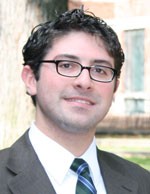Rutgers–Newark Law Professor Proposes State Law Reform to Promote Widespread Access to the Will-Making Process
NEWARK, NJ – Most Americans die without a will even though the Constitution provides sweeping protections for “testamentary freedom,” which is the power to control the succession of property at death.
Without a will, property passes to heirs determined by state law, who may or may not be the deceased’s intended beneficiaries. When unintended, intestacy (dying without a will) causes economic disruption for family units that are not provided for under the default inheritance rules. At a macroeconomic level, widespread intestacy contributes to the growing problem of wealth inequality in the United States.
Reid K. Weisbord, Assistant Professor of Law at Rutgers School of Law–Newark, attributes the high rate of intestacy to the complexity of the will-making process and proposes legislative reform to simplify and promote the execution of wills: Attach a “testamentary schedule” as an optional form to the state individual income tax return. “Preparing your tax return and planning for the disposition of assets after you die are complementary processes,” says Weisbord. “If the two were integrated, taxpayers would encounter the will-making process at the best possible moment – the time of year when they are already required to think about matters of money, income, property, and financial dependents.”

Professor Weisbord proposes that legislatures take another look at statutory form wills but with several important innovations. Most novel is his recommendation to attach the statutory form will to the state income tax return as an optional schedule called a “Testamentary Schedule – Last Will and Testament.” His article includes both a sample will and revocation form. Weisbord recommends that states allow both forms to be prepared and filed electronically year-round, governed by the same procedures as the state income tax return.
The testamentary schedule has easier-to-understand language and offers greater flexibility regarding distribution of the estate than existing statutory form wills. Like the income tax return, the schedule would not require witness attestation, would be filed (preferably electronically) with the state for safekeeping, and would be protected from disclosure during the will-writer’s life.
Catching individuals at the optimal time for estate planning is not the only benefit of integrating the tax and testamentary processes. Weisbord notes that completing an optional statutory form as part of an annual routine would reduce the incidence of stale wills, while having the state retain the testamentary schedule until probate would alleviate the problem of lost wills.
“Unlike other acts of legal significance, such as entering into a marriage or consumer contract, the will-making process is unfamiliar to most individuals and uniquely complex,” says Weisbord. “A legislative solution that renders the will-making process universally accessible without the need for legal representation would decrease the high rate of intestacy and greatly benefit those of modest means who are most deterred by the complexity and cost of making a will.”
A manuscript of the forthcoming article is available at http://papers.ssrn.com/sol3/papers.cfm?abstract_id=1978559.
Professor Weisbord joined the Rutgers faculty in 2010 after serving as a law clerk to the Hon. Jane R. Roth, U.S. Court of Appeals for the Third Circuit. He previously clerked for the Hon. Norma L. Shapiro, U.S. District Court, Eastern District of Pennsylvania, and practiced in the litigation department of Dechert LLP in Philadelphia. He received a B.S. from the Wharton School of Business, University of Pennsylvania, and a J.D. from the University of Pennsylvania Law School.
Media Contact: Janet Donohue
973-353-5553
E-mail: jdonohue@andromeda.rutgers.edu